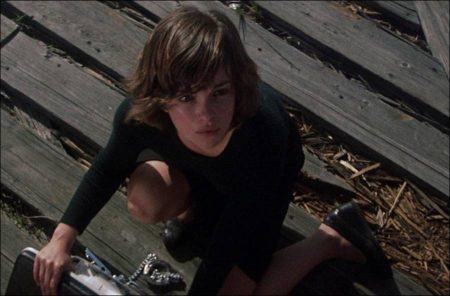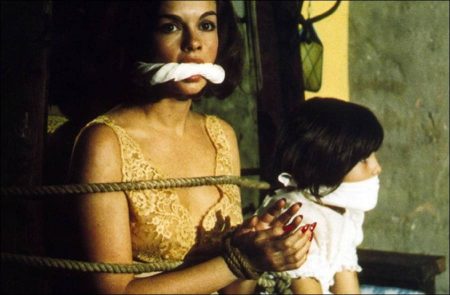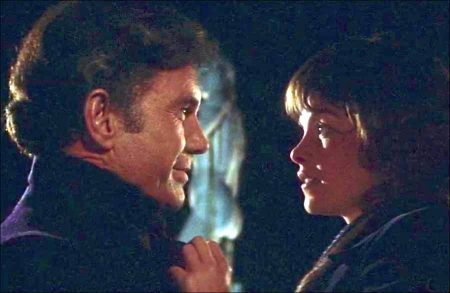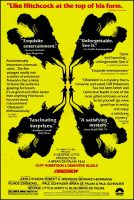Taglines: Love never dies, though money certainly complicates matters…
Obsession movie storyline. In 1959, In New Orleans, the businessman Michael “Mike” Courtland celebrates the tenth wedding anniversary with his beloved wife Elizabeth with a party in his manor. Late night, Elizabeth and their daughter Amy are abducted and the kidnappers leave a note asking the ransom of US$ 500,000.00. However Mike calls the police but the rescue operation is a mess. When the criminals are pursued, there is a car crash and it explodes. Mike blames himself for the death of Elizabeth and Amy and builds a memorial in the location of the accident.
In 1975, Mike travels with his partner Robert Lasalle to Florence in a business trip and when he goes to the church where he first met Elizabeth, he sees the worker Sandra Portinari that is working in the restoration of a painting of Madonna and is a dead ringer of Elizabeth. Mike becomes obsessed in Sandra and dates her. When Mike travels back to NOLA, he brings Sandra planning to marry her. However, Sandra is also kidnapped and Mike finds a ransom note identical to the one he received when Elizabeth was abducted. Now Mike believes that destiny has given a second chance to him and he does not want to blow it.

Obsession is a 1976 American neo noir psychological thriller mystery film directed by Brian De Palma, starring Cliff Robertson, Geneviève Bujold, John Lithgow, and Stocker Fontelieu. The screenplay was by Paul Schrader, from a story by De Palma and Schrader. Bernard Herrmann provided the film’s soundtrack prior to his death in 1975. The story is about a New Orleans businessman who is haunted by guilt following the death of his wife and daughter during a kidnapping-rescue attempt gone wrong. Years after the tragedy, he meets and falls in love with a young woman who is the exact look-alike of his long dead wife.
Both De Palma and Schrader have pointed to Alfred Hitchcock’s Vertigo (1958) as the major inspiration for Obsession’s narrative and thematic concerns. Schrader’s script was extensively rewritten and pared down by De Palma prior to shooting, causing the screenwriter to proclaim a complete lack of interest in the film’s subsequent production and release.
Completed in 1975, Columbia Pictures picked up the distribution rights but demanded that minor changes be made to reduce potentially controversial aspects of the plot. When finally released in the late summer of 1976, it became De Palma’s first substantial box office success and received a mixed response from critics.
About the Production
Brian De Palma and Paul Schrader devised a story with a narrative inspired by Alfred Hitchcock’s Vertigo, a film that both of them admired. Schrader’s original screenplay, titled Déjà Vu, was reportedly much longer than the final film, with a coda that extended another ten years beyond where the film now ends. De Palma ultimately found Schrader’s screenplay unfilmable due to its length, and rewrote and condensed the finale himself after Schrader refused to make the requested changes.
According to De Palma, “Paul Schrader’s ending actually went on for another act of obsession. I felt it was much too complicated, and wouldn’t sustain, so I abbreviated it.” The film’s composer, Bernard Herrmann, agreed that the original ending should be jettisoned, telling De Palma, after reading Schrader’s version, “Get rid of it — that’ll never work”. Schrader remained resentful of De Palma’s rewrite for years, and claimed to have lost all interest in the project once the change was made. Schrader indicated that “the original three part story conclude with a section set in the future (1985). My original idea in the script was to write an obsessive love where transcended the normal strictures of time.”
De Palma said, “It made Schrader very unhappy: he thought I’d truncated his masterpiece. He’s never been the same since.” Schrader stated that “the future section was cut from the script for budgetary reasons” however rumor had it that Bernard Herrmann suggested the cuts when he was working on the score for the film because he felt the last third set in the future didn’t work.
After the film was completed, Bernard Herrmann considered it the finest film in his musical career. Columbia executives expressed unease over the incest theme, especially as it was portrayed in such a heavily romanticized manner. Consequently, a few minor changes were made to a pivotal sequence between Robertson and Bujold, in which dissolves and visual “ripples” were inserted over the wedding and post-wedding scenes to suggest that the consummation of their marriage only took place in a dream sequence.
The film’s editor, Paul Hirsch, agreed with the decision to obscure the incest theme, noting, “I thought it was a mistake to drag incest into what was basically a romantic mystery, so I suggested to Brian, ‘What if it never happened? What if instead of having them get married, Michael only dreams of getting married? We have this shot of Cliff Robertson asleep. We could use that and then cut to the wedding sequence.’ And that’s what we did. It became a projection of his desires rather than actual fact.”
In the documentary De Palma, the director indicated that he felt the major flaw of the film was in casting Academy Award winner Cliff Robertson. De Palma felt that Robertson couldn’t play the anguish of the character. De Palma was effusive in his praise of Bujold who he felt had the more difficult role, which she played admirably, giving the film the emotional resonance needed for the project.
Obsession (1976)
Directed by: Brian De Palma
Starring: Cliff Robertson, Geneviève Bujold, John Lithgow, Stocker Fontelieu, Sylvia Kuumba Williams, Wanda Blackman, J. Patrick McNamara, Stanley J. Reyes, Nick Kreiger, Andrea Esterhazy
Screenplay by: Paul Schrader
Production Design by: Frank Beetson
Cinematography by: Vilmos Zsigmond
Film Editing by: Paul Hirsch
Costume Design by: Frank Balchus
Set Decoration by: Jerry Wunderlich
Art Direction by: Jack Senter
Music by: Bernard Herrmann
MPAA Rating: None.
Distributed by: Columbia Pictures
Release Date: August 1, 1976 (New York City premiere)
Views: 326










